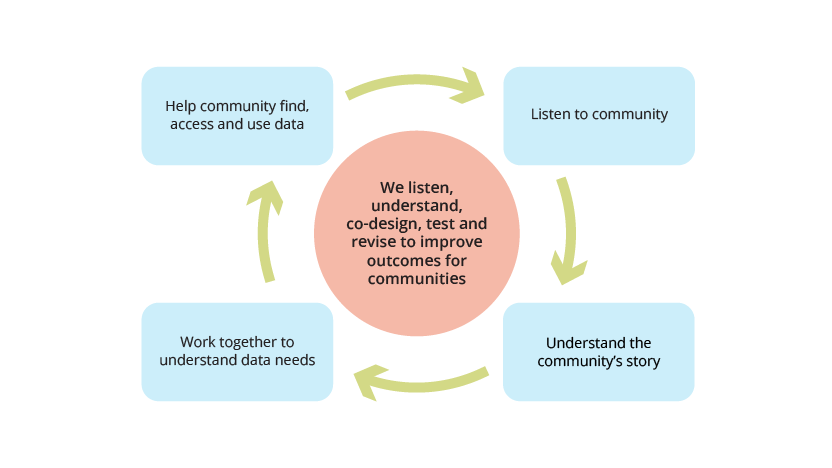Community program
Learn about the work of the Community Data Liaison Officers
Community Data Liaison Officers
The Community Data Liaison Officers (CDLOs) are working with communities, community organisations, and place-based initiatives across Australia. The CDLOs are helping communities find and access data and build skills in using data for local decision making. The CDLOs are also gathering information needs to inform future ABS statistics.
Community engagement cycle
Image

Description
The ABS community engagement cycle is as follows: Listen to community, Understand the community's story, Work together to understand data needs, Help community find access and use data. At the centre of all these steps we listen, understand, co-design, test and revise to improve outcomes for communities.
The CDLOs help communities to:
- Find relevant data:
- identify available data that are important to communities.
- assist with access to data including potential new data sources.
- Use data:
- build skills in using data by providing training to communities.
- increase confidence in understanding data.
- Make new data available:
- help improve how ABS publishes data.
- inform new data outputs as part of the LCDI.
- Community context:
- provide local context for data.
Examples of LCDI community program
Example 1:
A community initiative wanted to know the number and characteristics of children who are enrolled in childcare in their local area.
A Community Data Liaison Officer spoke with the community organisation about their data needs and arranged for publicly available childcare data to be provided, together with data on the population of children aged 0-5 years. These data will be used by the community to better understand childcare access in the community.
Example 2:
A community organisation wanted to understand how far residents travel to access health-related services in their area.
A Community Data Liaison Officer sought details on this data need. This feedback is now part of intelligence gathered from communities that could inform future statistical developments.
Example 3:
A community organisation wanted to understand the number of families with dependent children where a member of the family has a chronic health condition.
The Community Data Liaison Officer provided data from ABS TableBuilder, together with resources to help the community obtain data from TableBuilder in future. The data are being used to plan for education and support sessions for families in the community.
Supporting Governance of Indigenous Data
The LCDI community program supports the Australian Public Service Framework for Governance of Indigenous Data. Community Data Liaison Officers are exploring opportunities to collaborate with Aboriginal and Torres Strait Islander communities.
Contacting the LCDI community program team
The LCDI community team can be contacted by emailing lcdi.community@abs.gov.au.